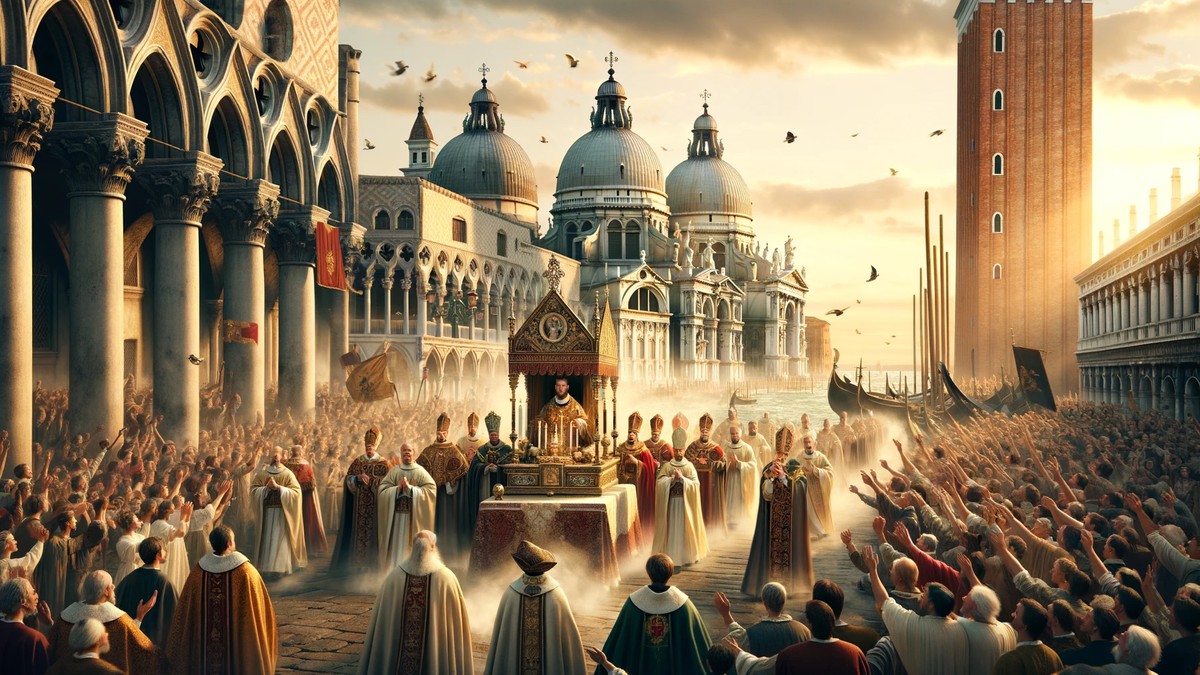Home>Christian Videos>Bible Stories>What Is St. John The Baptist Patron Saint Of


Bible Stories
What Is St. John The Baptist Patron Saint Of
Published: March 6, 2024
Peter Smith, Editorial Director at Christian.net, combines deep insights into faith, politics, and culture to lead content creation that resonates widely. Awarded for his contributions to religious discourse, he previously headed a major organization for religious communicators, enhancing dialogue on faith's societal impacts.
Discover the significance of St. John the Baptist as the patron saint of various causes and learn about his role in biblical stories. Explore his influence and importance in Christian tradition.
(Many of the links in this article redirect to a specific reviewed product. Your purchase of these products through affiliate links helps to generate commission for Christian.net, at no extra cost. Learn more)
Table of Contents
Introduction
Who is St. John the Baptist, and what is he the patron saint of? This question often arises among those seeking to understand the significance of this revered figure in Christianity. In this article, we will delve into the life of St. John the Baptist, explore the role of a patron saint, and specifically focus on the patronage of St. John the Baptist. Understanding the patronage of St. John the Baptist can provide insight into the ways in which he is venerated and celebrated within the Christian faith.
Read more: What Is St John The Baptist Patron Saint Of
The Life of St. John the Baptist
-
Birth and Family: St. John the Baptist, also known as John the Forerunner, was born to the priest Zechariah and his wife Elizabeth. According to the Gospel of Luke, his birth was foretold by the angel Gabriel, who appeared to Zechariah while he was performing his duties in the temple.
-
Ministry and Baptism: John the Baptist is renowned for his role as a prophet and for baptizing Jesus Christ in the River Jordan. His ministry focused on preaching repentance and preparing the way for the coming of the Messiah. He baptized people as a symbol of cleansing and spiritual renewal.
-
Preaching and Influence: John the Baptist's preaching attracted a significant following, and he was known for his ascetic lifestyle, living in the wilderness and subsisting on a diet of locusts and wild honey. His message of repentance and the imminent arrival of the Messiah resonated with many, drawing people from various walks of life to seek spiritual guidance from him.
-
Imprisonment and Martyrdom: John the Baptist's fearless condemnation of King Herod's unlawful marriage led to his imprisonment and eventual martyrdom. Despite the risks, he remained steadfast in his commitment to speaking the truth, even in the face of powerful opposition.
-
Legacy and Veneration: St. John the Baptist's unwavering dedication to his divine calling and his pivotal role in baptizing Jesus have solidified his place as a revered figure in Christianity. His life and teachings continue to inspire believers around the world, and his feast day is celebrated with great reverence and joy.
Understanding the life of St. John the Baptist provides a profound insight into his character, his unwavering faith, and his pivotal role in preparing the way for the ministry of Jesus Christ.
The Role of a Patron Saint
-
Intercessor: A patron saint is believed to act as an intercessor, someone who can advocate for and mediate on behalf of individuals or groups. In the Christian tradition, patron saints are revered for their ability to intercede with God, offering prayers and petitions on behalf of those who venerate them. This intercessory role is seen as a powerful source of spiritual support and guidance for believers facing various challenges and seeking divine assistance.
-
Specialized Patronage: Patron saints are often associated with specific causes, professions, or aspects of life. For example, there are patron saints of healing, travelers, students, and even specific occupations such as firefighters, teachers, and artists. This specialized patronage reflects the belief that certain saints have a particular affinity for understanding and addressing the needs of individuals engaged in specific activities or facing particular circumstances.
-
Inspiration and Example: Patron saints serve as sources of inspiration and examples of virtuous living. Their lives, deeds, and devotion to their faith are held up as models for believers to emulate. By studying the lives of patron saints, individuals can draw strength, guidance, and encouragement in their own spiritual journeys, striving to embody the virtues and principles exemplified by these revered figures.
-
Cultural and Regional Significance: Patron saints often hold significant cultural and regional importance. They may be revered as guardians and protectors of specific communities, cities, or nations, with their feast days celebrated through traditional customs, rituals, and festivities. This cultural significance fosters a sense of identity, unity, and pride among those who honor the patron saint associated with their heritage.
-
Symbol of Hope and Comfort: The patronage of saints is deeply intertwined with the concept of hope and comfort. Believers turn to their patron saints in times of distress, seeking solace, guidance, and reassurance. The patron saint is viewed as a compassionate ally, offering spiritual solace and a sense of companionship during moments of difficulty and uncertainty.
Understanding the multifaceted role of a patron saint provides insight into the profound impact these revered figures have on the spiritual lives of believers, offering guidance, support, and a sense of connection to the divine.
St. John the Baptist as a Patron Saint
-
Patron of Baptism: St. John the Baptist holds a significant role as the patron saint of baptism. His act of baptizing Jesus Christ in the River Jordan symbolizes the sacrament of baptism in Christian faith. As a patron saint of baptism, St. John the Baptist is invoked for guidance, strength, and spiritual cleansing for individuals undergoing the sacrament of baptism, as well as for those seeking renewal and a deeper connection to their faith through the symbolic act of baptism.
-
Intercessor for Repentance and Forgiveness: St. John the Baptist's emphasis on repentance and spiritual renewal during his ministry aligns with his role as an intercessor for those seeking forgiveness and reconciliation. As the patron saint of repentance, he is venerated by individuals striving to amend their ways, seek forgiveness for their transgressions, and embark on a path of spiritual transformation. Believers turn to St. John the Baptist for his intercessory prayers in their pursuit of inner healing and reconciliation with God.
-
Protector of Preachers and Prophets: Given his fervent preaching and prophetic role in preparing the way for the Messiah, St. John the Baptist is revered as a protector and guide for preachers, prophets, and those who proclaim the message of faith. As the patron saint of preachers, he is invoked for inspiration, courage, and clarity of speech for individuals called to share the teachings of Christianity. His steadfast commitment to proclaiming the truth serves as a source of encouragement for those dedicated to spreading the Gospel.
-
Guardian of Wilderness and Solitude: St. John the Baptist's ascetic lifestyle, characterized by his dwelling in the wilderness and solitary existence, positions him as a guardian of those seeking spiritual solitude and contemplation. As the patron saint of hermits and those living a monastic life, he is revered for his dedication to a life of prayer, simplicity, and detachment from worldly distractions. Individuals drawn to a life of solitude and seeking spiritual enlightenment in seclusion turn to St. John the Baptist for his guidance and blessings.
-
Inspiration for Moral Courage and Integrity: St. John the Baptist's unwavering commitment to speaking truth to power, even in the face of persecution and martyrdom, makes him an inspiration for individuals striving for moral courage and integrity. As the patron saint of moral strength, he is invoked by those facing adversity, oppression, or ethical dilemmas, seeking the fortitude to uphold their convictions and stand firm in their faith, regardless of the challenges they encounter.
St. John the Baptist's patronage encompasses a diverse range of spiritual needs, reflecting the profound impact of his life, teachings, and unwavering devotion to his divine calling. Believers across the world turn to him for guidance, intercession, and spiritual support in various aspects of their faith journeys.
Celebrating St. John the Baptist's Feast Day
St. John the Baptist's feast day, also known as the Nativity of St. John the Baptist, is celebrated on June 24th in the Christian calendar. This occasion holds great significance for believers around the world, as it commemorates the birth of St. John the Baptist and his pivotal role in preparing the way for the ministry of Jesus Christ. The celebration of St. John the Baptist's feast day is marked by various customs, traditions, and religious observances that honor his life, teachings, and enduring legacy within the Christian faith.
Read more: Why Did St John The Baptist Became A Saint
1. Rituals and Observances
On St. John the Baptist's feast day, churches and Christian communities conduct special religious services and liturgical ceremonies to honor the saint. These services often include prayers, hymns, and readings that reflect on the life and ministry of St. John the Baptist, emphasizing his role as a herald of Christ and a symbol of spiritual renewal. Believers gather to participate in these solemn observances, seeking inspiration and guidance from the saint's example of unwavering faith and dedication to his divine calling.
2. Symbolic Traditions
The feast day of St. John the Baptist is associated with a rich tapestry of symbolic traditions that reflect the saint's connection to themes of baptism, repentance, and spiritual purification. In some cultures, it is customary to engage in ritualistic acts of cleansing, such as bathing in natural bodies of water, as a symbolic gesture of spiritual renewal and purification. Additionally, bonfires may be lit as a symbol of light overcoming darkness, echoing the saint's role as a herald of Christ's coming and the dispeller of spiritual ignorance.
3. Festive Celebrations
In many regions, the feast day of St. John the Baptist is celebrated with joyous festivities that bring communities together in a spirit of camaraderie and faith. These celebrations often feature traditional music, dance, and culinary delights, creating a vibrant atmosphere of cultural expression and communal revelry. The festivities serve as an opportunity for believers to express gratitude for the saint's enduring influence and to strengthen bonds within their religious communities.
4. Cultural Customs
The celebration of St. John the Baptist's feast day is intertwined with diverse cultural customs that reflect the saint's revered status in different regions. These customs may include processions, parades, and the adornment of churches and public spaces with floral decorations and symbolic imagery associated with St. John the Baptist. Through these cultural expressions, believers pay homage to the saint's legacy and affirm their shared devotion to his teachings and spiritual significance.
Read more: Who Is Saint John The Baptist
5. Acts of Charity and Compassion
As a patron saint known for his commitment to justice and righteousness, the feast day of St. John the Baptist often inspires acts of charity and compassion within Christian communities. Believers may engage in charitable endeavors, such as feeding the hungry, providing assistance to the less fortunate, and offering support to those in need. These acts of kindness and generosity serve as a reflection of the saint's enduring influence in promoting social justice and compassion for the marginalized.
The celebration of St. John the Baptist's feast day serves as a poignant reminder of the saint's enduring impact on the Christian faith and his role as a spiritual guide for believers seeking renewal, repentance, and unwavering devotion to their faith. Through the rich tapestry of rituals, traditions, and communal celebrations, believers honor the legacy of St. John the Baptist and draw inspiration from his exemplary life and teachings.













